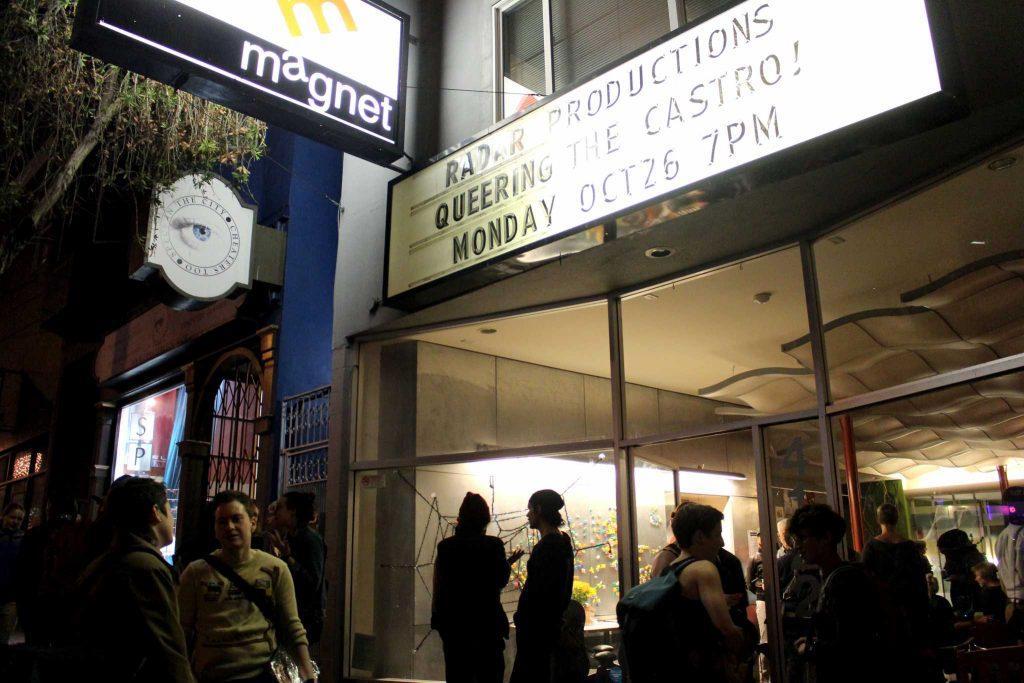What is the purpose of spoken word or performance art? For some, performance art serves as a tool to merely express their frustrations. For the queer, trans, people of color participating in Radar’s Queering the Castro, Hella Close: Stories of Queer Intimacy series, however their readings of private, personal and vulnerable love stories serve as platform to bring a community of people together.

“Hella Close: Stories of Queer Intimacy’ series is part of Radar’s Queering the Castro program, a year-long literary arts program meant to inject the Castro with some queer sass,” said emcee and executive director for the event, Juliana Delgado Lopera. “The goal of Queering the Castro is to return surprise and spontaneity, critique and camp, art and activism to a storied neighborhood that has gotten a serious case of the suburban blahs.”
Queering the Castro will use literature and performance to wake up and reinvigorate the area, reminding folks of the Castro’s joyfully radical roots and inspiring commitment to exploring the wild, weird potential of queer culture, according to Lopera.
Jezebel Delilah (Vanessa Rochelle), senior editor for Black Girl Dangerous, read during the first installments of the series. Her piece “Godiva” touched on social justice and the trauma that often comes with growing up queer and how that trauma manifests itself in personal relationships later in life.
“Performance art helps us see each other in a beautiful, more complex way,” Delilah said. “It brings back the humanity of those of us that walk around with marginalized identities.”
Delilah says that seeing that humanity in each other is a part of anti-oppression work.
“I think when we get out there and share our stories, it invites people to see us in a full, genuine, compassionate way, and that allows them to see others who are different than them in the same way,” she said.
San Francisco’s grants for the arts department provided Radar Productions with $25,000 for its Queering the Castro series of performances, readings and panel discussions, according to Lopera.
The idea for the series came from Sophie Calle’s summer exhibit on intimacy in which she photographed close-up images of the human body.
“It made me think about intimacy in public spaces and how queer intimacy, especially QTPOC intimacy, rarely takes up public space in San Francisco,” Lopea said. “The series is meant to showcase moments of intimacy rarely heard in the LGBT movement.”
SF State theatre major Lena White said performance art can be used as a tool to speak on large-scale social issues, including intimacy issues pertaining to the LGBTQ community.

“I think performance art and theater in general can totally be used as a medium for individuals to voice their concerns, opinions or fears with the public through the act of performance art rather than everyday dialogue,” White said. “For instance, the show that we just put on by the theatre department at SFSU, ‘Stop Kiss,’ is about two females who get attacked on the street for being intimate with each other. These kinds of plays really get people thinking about LGBT issues, and it’s used as a way to reach people on a higher scale.”
University of California, Berkeley business major Kara Enomoto said that Delilah’s performance was the first time she ever really thought about queer folks being “intimate.”
“I’ve been to readings like the ‘Vagina Monologues’ and stuff like that, but I had never been to any event that was ‘queer,'” Enomoto said. “You always hear about gay rights, gay marriage and gay politics, but I feel like we forget about the intimacy part. We forget about these individuals’ love stories.”
Enomoto attended the event to accompany her “bi-curious” friend and said the space felt very welcoming, diverse and safe.
Lopera said it was definitely a sacred feeling being inside Magnet that Tuesday night and listening to all the performances.
“There were over 100 people inside, and at some point we had to close the doors because we couldn’t fit any more,” she said. “I think the reason so many people attended is because there are not many queer spaces left in San Francisco, and we all crave to listen to our stories – to see them materialize, to connect.”
The next Queering the Castro reading will take place on Nov. 10 in the San Francisco Public Library.







